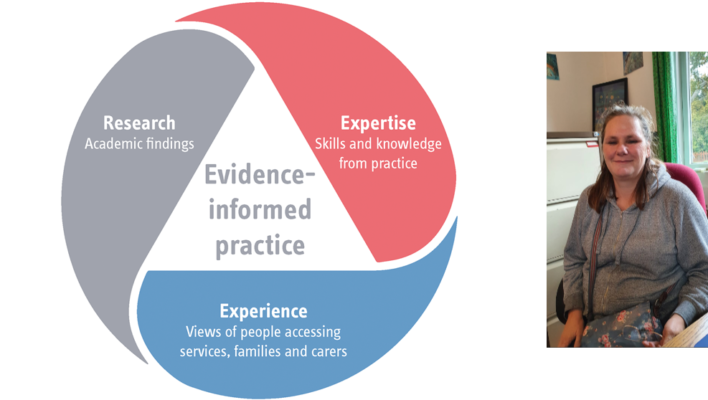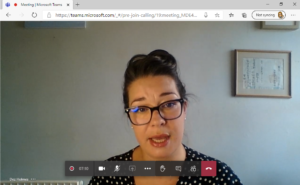Why it’s important to involve people with lived experience in strategic discussions

Above right: Nikki Hewson
By Dyfrig Williams
The evidence-informed practice model is at the heart of our work at Research in Practice, which means that when we develop resources we bring together academic research, practice expertise and the experiences of people accessing services.
Learning from research is not put into practice as much as it might be. When we use it, we need to reflect on the context we are using it in. By thinking about evidence-informed practice, we are bringing together different types of knowledge to better understand the situation at hand. This is so important in the complex environment of public service. By ensuring that the views of people accessing services are fed into the decision-making process, we are better able to ensure that the approach is responsive and can be delivered effectively.
It is always important to involve people with lived experience, but it is particularly important when designing strategic resources. Public services are predominantly structured according to the principles of Taylorism, where there is a hierarchy in place. At its worst, it can segregate the knowledge of how it looks and feels to access and deliver services from forums where decisions are made.
Moving toward a fairer future
This is why we were so glad to have Nikki Hewson and Tom Croft from ATD Fourth World share their knowledge and experiences with us at our Leaders’ Forum discussion on equality. The event looked at what leaders of services can do to help us move towards a fairer future. Tom quoted Professor Kate Morris’ work to describe
poverty as ‘the wallpaper of practice’, in that it’s ‘too big to tackle and too familiar to notice’.
It really hit home that poverty is a multi-dimensional issue — it affects every part of someone’s life. It’s structural in origin, and controls what people have access to. Poverty is often central to what’s going on in a family’s life, but sometimes in professional practice it can be overlooked in assessment or even cast as a parental failing. Some parents express deep concern about services that are delivered so inappropriately that they become disempowering or even oppressive.
Tom Croft
Parent-to-parent advocacy
It was really helpful to have Nikki Hewson at the event to share her experiences. Nikki has been a parent advocate since 2012 with Lewisham Social Services, where she has supported families at case conferences. She talked about how advocacy has helped to make the system fairer by addressing the power dynamics in the room. By having an advocate there, parents have someone next to them who can support them and who knows what it feels like to be in their position. She shared some great examples of how she has helped parents to stay calm in stressful situations.
Nikki spoke about how people with lived experience have a perspective across a whole system, which is often missed when people working within services look at things from their individual viewpoints. Sometimes, all they can see is the part that they are responsible for, which means that involving people in the design of the service that they receive is incredibly important to understanding intersections and system-wide issues.
Space for empathy
Clearly, people join the social care sector because they want to make a positive difference in people’s lives. Nikki’s reflections on her role led to a helpful discussion on the role of process within the work of public service. Sticking rigorously to one way of working can remove the space for empathy for the people who are accessing services. W. Edwards Deming once said that ‘a bad system will beat a good person every time’. [To read Nikki’s remarks, please click here.]
Leaders at the event started reflecting on what they might be able to do differently to enable people in their organisations to provide better services, particularly around the importance of ongoing learning to service improvement and how that learning can be put into practice through, for example, a Human Learning Systems approach.
“Normal” was never good enough
Tom and Nikki’s experiences were invaluable. By bringing them together with academics and local service leaders who were attending, we were able to give participants the space to reflect on their work and to helpfully challenge them to working differently where it is appropriate.
Our Chair and Director of Research in Practice, Dez Holmes, said on the day that going back to ‘normal’ or business as usual isn’t good enough, and was never good enough for too many citizens. Instead, public services need to ‘build back better’, and to build back better we need to involve people with lived experience in our work. Only then can we see the whole picture and design a better future for the sector, for people who access services and society as a whole.
Dez Holmes



